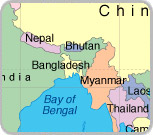Identifying & Treating Breast Cancer
|
>> Identifying & Treating Women with Advanced Breast Cancer in Bangladesh
In mid 2006 BFES/Amader Gram partnered with the International Breast Cancer Research Foundation (www.ibcrf.org) to become one of 9 countries participating in a clinical trial titled “Phase III randomized study of luteal phase vs. follicular phase surgical oophorectomy and tamoxifen in premenopausal women with metastatic hormone receptor-positive breast cancer.” Amader Gram provides the oversight and administration of this trial at partnering Dhaka Medical College Hospital and Khulna Medical College Hospital.
Bangladesh, however, having a low level of public awareness of the importance of early treatment for breast problems and almost no breast health services, was a difficult place to recruit participants for the clinical trial. Unlike other countries where the majority of women with breast problems go to major hospitals for care, many women in Bangladesh either never seek treatment, or arrive at hospitals with late-stage cancer, which is often untreatable. Numerous social, economic, health-system related and political issues factor into these circumstances, complicating an already challenging situation. It was clear that the clinical trial would face difficulties without a complementary strategy for recruitment.
Recognizing that these challenges needed to be addressed before the clinical trial could be successful, IBCRF asked BFES/Amader Gram to help develop a unique solution. As a pioneer for rural ICT efforts, BFES/Amader Gram is an established and respected organization in the communities in which it works. In Bagerhat, BFES/Amader Gram has had a computer learning center in place for a number of years, training hundreds of young men and women on the use and application of computers. This well known and comfortable place was to be the site for the first free walk-in breast problem clinic.
When, Where & How?
The breast problem clinic is held three days per week in a private examination room connected to the Amader Gram offices. A trained female doctor and medical assistant attend each clinic, examining and keeping records of each woman who comes to the clinic. Women are provided advice and supportive care; those with more serious issues are referred to an affiliated doctor at Khulna Medical College. Regular advertising of the clinic is conducted and the local hospital and family planning clinic refer patients with breast problems to our clinic. Over 500 women have been examined, with 18 receiving treatment through the clinical trial as of October 2007.
The relationship of the clinic to the Amader Gram IT center has been a wonderful complement. Trained professionals in database development and management have created a user-friendly client database from which patients can be tracked from visit to visit. This activity is a real-world example for IT center participants of how computer skills can be utilized for the improvement of health, providing an invaluable service for the clinicians and important data on breast problems in Bangladesh.
With increasing media attention to this clinic, doctors and patients across the country are asking for a replication of this service in their areas. BFES/Amader Gram and IBCRF are working together to expand this model clinic to other parts of Bangladesh in which BFES/Amader Gram works. It is our hope that someday this model will be adopted by health clinics throughout the country, assuring prompt and supportive care for Bangladeshi women with breast problems.
To know more about this project please visit: www.agbreastcare.org

